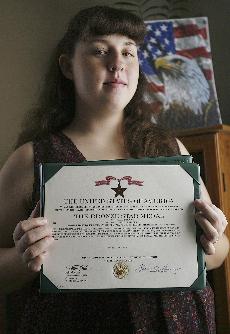Kentucky resident receives Bronze Star, relates story of valor

Kentucky National Guard soldier Ashley Pullen shows off her Bronze Star citation at her home in Beaumont, Ky., Nov. 2. The Associated Press
Dec 5, 2006
Spc. Ashley Pullen wasn’t thinking about the dozens of Iraqi insurgents who had just ambushed the convoy. Or their piles of guns and grenades or the bullets ripping through the air around her.
Her bloody comrade lay on the road south of Baghdad, and she had to help the gravely wounded soldier – fast.
It was March 20, 2005, the day Pullen, a member of the Kentucky National Guard’s 617th Military Police Company, became a hero. It was the day that would earn this daughter of small-town America a Bronze Star for valor.
Now, 21 months later, Pullen is being treated for post-traumatic stress disorder, the result of a year in Iraq marked by harrowing brushes with danger and death – tempered with daily prayers for survival.
Pullen, now 22, doesn’t go out much these days and she says her moods swing for no reason.
Get The Daily Illini in your inbox!
“It’s just an emotional roller coaster every day,” she says. “I have no other way to describe it. I can be a perfectly happy, normal person. Then five seconds later, I will be so mad that I can’t see straight.”
Pullen, who joined the Guard at age 17 to help pay for college, didn’t want a desk job. She chose the military police, feeling it better suited someone who “likes to be to be in the middle of everything.” In Iraq, she found herself in the thick of explosions, gunfire and mortar attacks.
The ambush that turned her into a hero started on a steamy March morning just outside Baghdad. Here’s how Pullen remembers it:
She was driving one of three Humvees providing security behind a 30-vehicle convoy when the crackle of gunshots and the boom of rocket-propelled grenades suddenly filled the air.
Pullen’s unit moved ahead to counterattack, flanking the insurgents so they couldn’t escape.
Pullen got out of her Humvee and braced herself against the back of it. She and other soldiers unleashed a torrent of gunfire and grenades on 40 to 50 insurgents attacking from a nearby orchard.
She could see the enemy clearly, armed with dozens of AK-47s, machine guns and grenades.
“You don’t have time to be scared,” she says. “You just have time to react. … The fear doesn’t set in until later when you say, ‘Oh my God, what happened?’ … When the bullets start flying, you’re saying, ‘OK, I want to live through this’ and you do everything you can to survive.”
Answering a radio call – “Everybody’s down! I need help” – Pullen backed up her Humvee part way, then ran about 300 feet to a gravely wounded sergeant, who was screaming and rocking in agony.
Dodging bullets, she dropped to her knees to help her comrade. “It hurts! It hurts!” he yelled. She got him out of his bloody vest, lifted his shirt and saw a single slug had pierced his stomach through his back. Pullen tried to bandage and calm him.
“Think of green grass and trees and home,” she said. “Think about your little boy. Think about ANYTHING but here.”
When it was over, at least 26 insurgents were dead and six were wounded. Three civilians in the convoy also were killed. The three wounded members of Pullen’s company all survived.
Pullen was awarded a Bronze Star with the V device for valor.
In a recommendation for Pullen’s medal, her company commander wrote: “Tremendous dedication and focus. Credited with saving the life of a team leader that day. Incredible courage.”
Pullen served seven more months in Iraq, learning to cope in a world where the threat of death was a daily fact of life.
“You get up in the morning, you say your prayers and you hope to God that you come back that night,” she says in her soft lilt. “You kind of get numb … which was my way of coping. You just kind of shut everything off and become a robot. Emotions get you nowhere. They get you in trouble. … It’s hard to come back and be normal.”
When she returned home last fall to Edmonton, Ky., her mother, stepfather and uncle – all Desert Storm veterans – praised her as a hero. Pullen doesn’t buy it.
“You got to do what you got to do,” she says. “I didn’t have a choice in the matter. If you see an accident on the road, you’re going to stop and make sure everything is OK. … It’s my job.”





